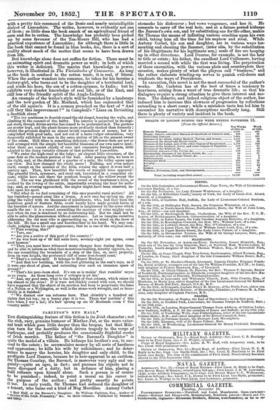CA.RLETON'S RED HALL. * Tnx distinguishing feature of this fiction is
its Irish character ; not the rich, racy, genuine humour of Misther-Pat, or the more exter- nal trait which goes little deeper than the brogue, but that Mile- sian turn for the horrible Which drives tragedy to the verge of burlesque, and probably produces the occasionally frightful modes of Irish murder. The father of "the Baronet's Daughter" is quite the model of a villain. He kidnaps his brother's son to suc- ceed to the estate ; he accumulates money by all sorts of hardness and oppression ; he kills his wife by unkindness ; and he deter- mines to marry the heroine his daughter and only child, to the profligate Lord Dunroe, because he is heir-apparent to an earldom. Sir Thomas Gourlay, the Baronet, is moreover very ugly and un- gainly—quite an ogre, in fact ; and pursues his objects not in mere disregard of a deity, but in defiance of him, placing a bold reliance upon himself alone. Such a person is of course to be punished ; indeed, to point a moral on his career is the purpose of the author • and pretty smartly he points It too. In early youth, Sir Thomas had, seduced the daughter of a tenant, who turns out a kind of Meg Merrilies. Antony Corbet • Red Hall, or the Baronet's Daughter. By William Carleton, Esq., Author of " Stories of the Iristi Peasantry." ho. In three volumes. Published by Saunders a.nd Otley. stomachs his dishonour ; but vows vengeance, and has it. He consents to carry off the real heir, and at a future period kidnaps the Baronet's own son, and by substituting one for the other, makes Sir Thomas the means of inflicting various cruelties upon his own child, taking him all the time for his nephew and rival. While Antony Corbet, his son antt daughter, are in various ways tor- menting and cheating the Baronet, (inter alia, by the substitution of his illegitimate for his legitimate son,) coals of fire are heaping up in other directions. Lord Dunroe, for example, is net the heir to title or estate ; his father, the excellent Lord Cullamore, having married a second wife while the first was living. The perpetration of these enormities, with the various plots and counterplots they occasion, makes plenty of what the players call "business," and the rather elaborate winding-up serves to punish evil-doers and vindicate the ways of Providence. In execution, this novel is not the most successful of the author's works. Mr. Carleton has at the best of times a tendency to heaviness, arising from a want of true dramatic life ; so that his dialogues require a strong situation to give them interest and mo- tion. The didactic, and indeed religious object of the author, has induced him to increase this slowness of progression by reflections extending to a short essay ; while a mistaken taste has led him to encumber his narrative with descriptions needlessly long. Still there is plenty of variety and incident in the book.


























 Previous page
Previous page